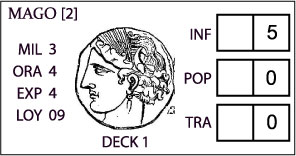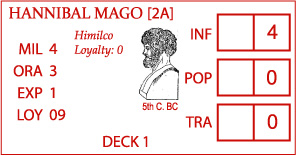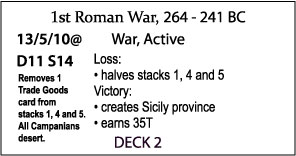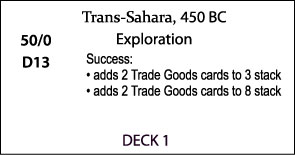- Combining this game with
The Republic of Rome
1. How to Play
- Play The Republic of Carthage through the end of the Early Republic.
(Even if during the last turn of the first deck there are fewer than
6 cards available, do not add cards from the second deck until after
completing the Carthage Revolution Phase.)
- Then, set up The Republic of
Rome in the usual way, starting with the first deck
and each The Republic
of Carthage player also taking over a The Republic of Rome faction.
Place the 1st Punic War as an Inactive War in the Roman Forum as
usual. The Carthaginian board begins with the 1st Roman War as an
Inactive War, in addition to any Active and Inactive Wars which
may already be on the board.
2. Sequence of Play
Each turn consists of the following, in order:
- Carthage:
- Carthage Mortality Phase
- Carthage Revenue Phase
- Carthage Trade Phase
- Carthage Forum Phase
- Rome:
- Rome Mortality Phase
- Rome Revenue Phase
- Rome Forum Phase
- Senate:
- Carthage Senate Phase
- Rome Senate Phase
- Exploration, Combat and Revolution:
- Combined Exploration and Combat Phase
- Carthage Revolution Phase
- Rome Revolution Phase
3. Effects of Wars
Effect on the other Forum.
When any Punic war appears in the Roman Forum, the Roman war with
the corresponding number becomes active on the
Carthaginian board.
When any Roman war appears on the Carthage board, the Punic war with
the corresponding number becomes active in the Roman Forum.
(If the now active
war card is not already present in the Forum, find it in the
deck, put it on the board and re-shuffle.)
Matching War and Leader cards continue to make Inactive Wars
Active as normal.
Should the Roman Senate attack and defeat a Punic War, it
makes the Roman War of the corresponding number a Lost War in
Carthage. Similarly, if the Carthaginian Senate attack and
defeat a Roman War, it makes the Punic War of the corresponding
number a Lost War in Rome. If in the same turn the Roman Senate
attacks a Punic War and the Carthaginian Senate attacks a Roman
War and both wars have the same number, the War cards are ignored
and combat is resolved as described below.
An extra restriction is added for this scenario: the Punic and the
Roman Wars must be addressed in numerical order, e.g. the second war may
not be attacked before the first.
Note that the 1st Roman War and 1st Punic War are essentially two-part
wars. The fleet part of the war must be defeated before the land part of
the war may be attempted. If the first part is accomplished, but not the
second and then on a subsequent turn the other side re-conquers the fleet
portion, but not the land portion, then the first side must once again
defeat the fleet portion before it can attack the land portion.
Any leader, i.e. Pyrrhus, Hannibal, Hamilcar or Scipio, who dies in one
Forum is also removed from the game in the other Forum, or is discarded
upon his appearance from the deck as if the card had not been in it.
4. Resolving Wars
When both sides are attacking the other's war of the same number,
resolve it as in Rebel combat. The force with highest combined
strength and commander military ratings is considered the attacker.
No Disaster/Standoff numbers are used.
5. Resolving Losses
Any losses except "ALL" are applied equally to both armies:
Victory.
The losing force loses the war.
Victory/No Losses.
Same as Victory, but in addition all the units of the losing
force are destroyed and the losing commanders must draw Mortality
Chits equal to the number of units lost.
Stalemate.
The war is undecided and can be continued
in the next Combat Phase, either by
fighting the respective War Cards or
if both sides send forces, against one
another. Surviving forces are left on
the respective war cards. The number
of Mortality Chits drawn remain the
same, but apply to both sides'
commanders.
Defeat.
The attacking force has lost the war.
Defeat/All.
Same as Defeat, but in addition the
attacking force, only, must draw Mortality
Chits.
6. Consequences of Defeat
When Carthage loses a war, apply the same effects as if the Senate
had sued for peace. When Rome loses a war, the war may no longer
be fought and will cost the Roman Senate 25T during the Revenue Phase
each turn thereafter. Any leader matching the Inactive War remains
in the Forum, active if other matching wars are present, becoming
inactive otherwise.
In the Combined game, if either side loses a war to the other, 15T of
the 25T paid each turn is paid directly into the state treasury of the winning side.
7. Ending the Combined Game
The Combined game ends on the turn in which the last
The Republic of
Carthage card is drawn in the Forum Phase or when the
last The Republic
of Rome Early Republic card is drawn, whichever comes second. Should
Rome run out of Early Republic cards prior to Carthage exhausting its
deck, the Roman Middle Republic deck should be used.
Should a player achieve conditions which would normally allow him to
win the game prior to its end, i.e.
becoming Consul for Life or successful Rebellion, the game does not end
as normal, but instead continues until the conditions in the previous paragraph
apply. A Senator who successfully rebels is considered Consul for Life.
A Consul for Life retains all of his powers for the remainder of the game or until
successfully assassinated; one assassination attempt can be attempted per turn
(i.e. normal rules for assassination attempts apply).
8. Winning the Combined Game
9. Players Notes
Players may approach this expanded version of The Republic of Rome with
uncertainty and confusion – this is expected! After all, you are
being asked to simultaneously play factions on both sides of a war
to the death, that is, to have a foot in each camp. Actually this
has been done before in games (cf. Russian Civil War, Junta) and so
should not come as a complete novelty. Players will quickly find that the
addition of the Carthaginian scene takes negotiation and scheming to
a whole new order of magnitude. There are new sets of options to
consider. No longer is success in Rome paramount for personal success.
If one doesn't do well in one Republic, there is always the other.
One can delay the success of rival factions by strong play in the other
Republic or even work against one of the Republics to permit the triumph
of the other (and one's own faction of course).
Some may view such approaches as "unpatriotic" within a particular
Republic, perhaps even unrealistic. But it should be kept in mind that
in both Rome and Carthage there were always political forces which for
their own reasons opposed war and sought to avoid it whenever possible.
Such peace parties don't make sense, can never make sense in the original
The Republic of Rome context because of its inherent nature as a war game. But
in The Republic of Carthage, the Senate may, by means of exploration and suing
for peace actually divert a portion of the republic's energy into
other activities. And in the combined game, life can be breathed into
the peace parties of Rome as well, providing another level of tension and
conflict so typical of the Roman Republic.
- Designer's Notes
Anyone who has played The Republic of Rome quickly appreciates its
superior design. Not simply for its depth of research and detail
and its uncompromising point-of-view, which are already leagues
ahead of many designs, but also it offers play opportunities and
machinations unique to gaming while still retaining an incredibly
real "feel" of the late Roman Republic. As a veteran of many games
and especially Internet-adjudicated The Republic of Rome games, I dug
deeper and deeper into background reading to find out more about
the realities behind the wars, statesmen, laws and provinces depicted
in the game. I was particularly seized with the discovery that
Rome's arch-enemy also possessed a Senate, possibly with similar
goings-on. It became clear that there were possibilities to graft
this game system into a Carthaginian sphere and from there, the
chief goal was to create a reflection of the unique aspects of
Phoenician-Carthaginian culture.
As a result, players will find introduced new concepts utterly
foreign to The Republic of Rome. The importance of trade and the person
of the trader are reflected in a new Trade Phase. In addition,
Carthage may explore and discover new trade opportunities. A
de-emphasis on war is reflected by lowered military ratings on most
senators, apart from their star, Hannibal, truly a world-class
commander of all time. The other way this de-emphasis appears is
in the use of occasionally unreliable mercenary legions and mercenary
cards.
Not much about the day-to-day proceedings of
the Carthaginian Senate is known – it may have been more of a
rubber stamp than the Roman one – but the Committee of Five and
their activities are documented. With wealth more derived from
trade than from agriculture, Carthage does not seem to have had the same
need for "bread and circuses"; thus there are no land bills or
games. Consequentially, popularity is harder to come by.
Both games share however a basic tension
between the good of the faction or senator and the good of the
state and now in addition to deciding how much to contribute to
the state treasury, players must consider the appropriate tax
rate. Refusal to return trade goods represents an interesting
additional method for disruption of the regime. All the Laws
included reflect actual laws enacted at some point in the history
of the Republic while the various events affecting trade
prices are more or less invented simply to throw a little uncertainty
into the trade process.
The Combined Game represents a larger time commitment than either
game individually, but is recommended for those who want to widen
even further the scope for power politics and chicanery. Players
may choose to "bet on" one Republic or the other, working against
one regime from within, but may find themselves scrambling if a
reversal occurs or if someone else manages to take the lead within
the winning side. Another interesting way to play this one is
using 6-12 players playing one faction only, that is, Roman and
Carthaginian groups competing for control of the Mediterranean
world. This setup should provide the most realistic simulation of
all.
When we play The Republic of Rome, the Punics are for the most
part the faceless enemy. Since the victors got to write the history
books, most of their documents were destroyed.
Who were they? What did they care about? How did their
system work? Who was admired in their culture? How did their political
systems work? What
about their religion? Was it like Rome's or different? These are some
of the things I wanted to reveal in this game, to give Carthage too,
at last, a face.



